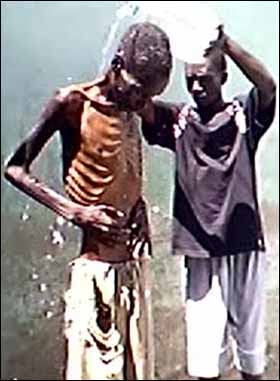ZIG Watch : Issue 4

As March drew to a close amid ongoing reports of lawlessness across the country, Prime Minister Morgan Tsvangirai warned those engaged in unlawful activities that they would be brought to justice. "Of particular importance is restoring the rule of law, without which we will not make progress on any front. I have tasked the Ministers of Home Affairs to ensure that all crimes are acted upon and the perpetrators arrested and charged. For too long a culture of entitlement and impunity has stained our society, but after the signing of the Global Political Agreement no crime will go unpunished," he said.
However, as Zimbabwe Inclusive Government (ZIG) Watch has demonstrated since its inception, the Rule of Law is violated daily by corrupt Zanu PF ministers who have enriched themselves ruthlessly at the expense of the entire population - and continue to do so.
Flagrant violation of the rule of law on Mount Carmel farm
We have added captions and background information to this footage, circulated to the media, of Ben Freeth's recent visit to his father-in-law's farm (on Good Friday, 10 April 2009). Shortly after this visit to Mount Carmel, Ben Freeth wrote an open letter to Prime Minister Morgan Tsvangirai:
Dear Prime Minister Tsvangirai
As you are aware I wrote an open letter to you 2 weeks ago asking where we were going because "soon it will be too late."
I likened our country’s economy to that of an engine that is continuing to be stripped. Unfortunately the stripping process has increased in momentum significantly since my letter; and police unfortunately remain complicit with it.
Zimbabwe's prisons are death-traps
 Zimbabwe's prisoners are suffering untold horrors in Zimbabwe's jails. The State is locking them up in hell-holes, condemning them to slow starvation and possible death from nutrition-related illnesses or the vast array of other diseases they are exposed to through unhygienic conditions. Despite terrible desperation, their position as 'prisoners' means they are denied the most basic human instinct and that is to fight for survival: inmates can't beg for food from passers-by, they can't forage for wild berries in the bush, and they can't rummage through dustbins for waste food. Because of this, Zimbabwe's prisons constitute a unique and especially cruel form of torture that has both physical and psychological impacts on the people affected.
Zimbabwe's prisoners are suffering untold horrors in Zimbabwe's jails. The State is locking them up in hell-holes, condemning them to slow starvation and possible death from nutrition-related illnesses or the vast array of other diseases they are exposed to through unhygienic conditions. Despite terrible desperation, their position as 'prisoners' means they are denied the most basic human instinct and that is to fight for survival: inmates can't beg for food from passers-by, they can't forage for wild berries in the bush, and they can't rummage through dustbins for waste food. Because of this, Zimbabwe's prisons constitute a unique and especially cruel form of torture that has both physical and psychological impacts on the people affected.
In October last year, the Zimbabwe Association for Crime Prevention and Rehabilitation of the Offender (ZACRO) released a report noting that there are 55 prisons in Zimbabwe (including satellites), with the capacity to hold 17 000 inmates. But in October 2008 it was estimated that more than 35 000 people were in jail.











